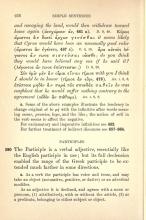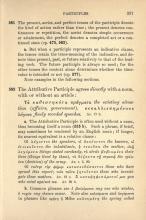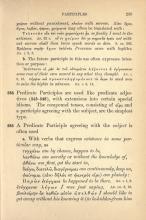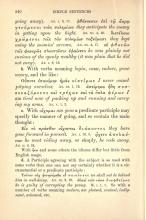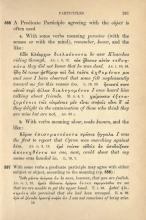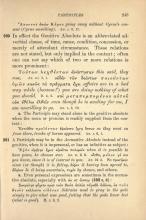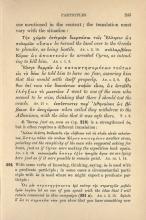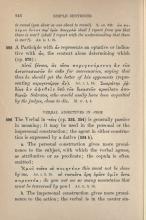580. The Participle is a verbal adjective, essentially like the English participle in use; but its full declension enabled the range of the Greek participle to be extended much farther in some directions.
a. As a verb the participle has voice and tense, and may take an object (accusative, genitive, or dative) or an adverbial modifier. As an adjective it is declined, and agrees with a noun or pronoun, (1) attributively, with or without the article, (2) as a predicate, belonging to either subject or object.
581. The present, aorist, and perfect tenses of the participle denote the kind of action rather than time; the present denotes continuance or repetition, the aorist denotes simple occurrence or attainment, the perfect denotes a completed act or a continued state (cp. §§ 475, 563).
a. But when a participle represents an indicative clause, the tenses retain the tense meaning of the indicative, and denote time present, past, or future relatively to that of the leading verb. The future participle is always so used; for the other tenses the context alone determines whether the time-value is intended or not (cp. § 577). Note examples in the following sections.
582. The Attributive Participle agrees directly with a noun, with or without an article.
Tὰ καθεστηκότα πρᾱ́γματα
the existing situation (affair, government)
κεκαλλιεπημένους λόγους
finely worded speeches
Plato Apology 17b
a. The Attributive Participle is often used without a noun, thus becoming itself a noun (§ 555.b). Such a phrase, if brief, may sometimes be rendered by an English noun; if longer, its nearest equivalent is a relative clause.
Oἱ λέγοντες
the speakers
οἱ ἀκούοντες
the hearers
οἱ ἐνοικοῦντες
the inhabitants
ἡ τεκοῦσα
the mother
εἰκῇ λεγόμενα
things stated carelessly
τὰ αὐτοῖς βεβιωμένα
their lives (things lived by them)
τὰ δόξαντα τῇ στρατιᾱ
the opinion (decision) of the army
Xen. Anabasis 1.3.20
Oἱ ταύτην τὴν φήμην κατασκεδάσαντες
those who have spread this report
τοὺς ταῦτα ζητοῦντας
those who investigate these matters
Plato Apology 18c
ὦ καταψηφισάμενοί μου
you who voted against me
Plato Apology 39c
b. Common phrases are ὁ βουλόμενος (any one who wishes), ὁ τυχών (any chance comer). Note also καλούμενος and λεγόμενος in phrases like
κρήνη ἡ Mίδου καλουμένη
the spring called Midas's, the so-called spring of Midas
τὸν ἱερὸν καλούμενον πόλεμον
the war called Sacred, the so-called Sacred war
c. With οὐ such a participial phrase refers to a particular person, thing, or class; with μή (§ 486) the phrase is more general, a merely supposed case.
Tοῖς μὴ πειθομένοις μετέμελε.
Any who did not take his advice repented.
Xen. Memorabilia 1.1.4
τοῖς οὐ πειθομένοις would have meant those people, a definite class, who in fact did not take his advice.
583. A Participle often agrees attributively with a noun or pronoun, without the article, adding some circumstance of the main action. (Circumstantial participle)
English uses the same construction, but less freely; a better rendering is often a relative clause, or an adverbial phrase or clause (of time, manner, cause, means, concession, condition), or even another verb parallel to the leading verb. The circumstantial participle without ἄν represents an indicative; the tense therefore generally denotes time (§ 581.a, above).
Ἡ μήτηρ ὑπῆρξε Κῡ́ρῳ φιλοῦσα αὐτὸν μᾶλλον.
His mother supported Cyrus, loving him more.
Xen. Anabasis 1.1.4
ἀκούσᾱσι τοῖς στρατηγοῖς ταῦτα ἔδοξε τὸ στράτευμα συναγαγεῖν.
On hearing this the generals decided to call together the army.
Xen. Anabasis 4.4.19
ὁ δὲ ἐλπίδας λέγων διῆγε.
But he kept putting them off by talking hopefully.
Xen. Anabasis 1.2.11
πρῶτον μὲν ἐδάκρῦε πολὺν χρόνον ἐστώς.
First he stood and wept for some time.
Xen. Anabasis 1.3.2
ταῦτα γὰρ καλῶς ἐγὼ εἰδὼς διώλεσα.
This, though I knew it well, I had let slip.
Soph. Oedipus the King 317–318
a. Certain participles occur often in idiomatic use, as ἀρχόμενος (beginning; at first), τελευτῶν (ending; finally), ἔχων (holding οn; constantly), θαρρῶν (boldly), λαθών (secretly), ἀνύσᾱς (quickly), χαῑ́ρων (without punishment), κλαίων (with sorrow). Also ἔχων, ἄγων, λαβών, φέρων, χρώμενος may often be translated with.
Tελευτῶν οὖν ἐπὶ τοὺς χειροτέχνᾱς ᾖα.
So finally I went to the artisans.
Plato Apology 22c
οὔ τι χαίρων δίς γε πημονᾱ̀ς ἐρεῖς.
Not without sorrow shalt thou twice speak words so dire.
Soph. Oedipus the King 363
Πρόξενος παρῆν ἔχων ὁπλῑ́τᾱς.
Proxenos came with hoplites.
Xen. Anabasis 1.2.3
b. The future participle in this use often expresses intention or purpose.
Ἀνῑ́σταντο οἱ μὲν ἐκ τοῦ αὐτομάτου λἐξοντες ἅ ἐγίγνωσκον.
Some rose of their own accord to say what they thought.
Xen. Anabasis 1.3.13
πέμψαι καὶ προκαταληψομένους τὰ ἄκρα
to send men to seize the heights in advance.
Xen. Anabasis 1.3.14
584. Predicate Participles are used like predicate adjectives (§§ 545 – 548), with extensions into certain special idioms. The compound tenses, consisting of εἰμι and a participle agreeing with the subject, are the simplest type.
585. A Predicate Participle agreeing with the subject is often used
a. With verbs that express existence in some particular way.
τυγχάνω
am by chance, happen to be
λανθάνω
am secretly or without the knowledge οf
φθάνω
am first, get the start in
διάγω, διατελῶ, διαγίγνομαι
am continuously, keep on
φαίνομαι (also δῆλός or φανερός εἰμι)
am plainly
Παρὼν ἐτύγχανε.
He happened to be there.
Xen. Anabasis 1.1.2
ἐτύγχανον λέγων
I was just saying
Xen. Anabasis 3.2.10
βουλοίμην ἂν λαθεῖν αὐτὸν ἀπελθών.
I should like to get away without his knowing it (to be-hidden-from him going away).
Xen. Anabasis 1.3.17
φθάνουσιν ἐπὶ τῷ ἄκρῳ γενόμενοι τοὺς πολεμίους.
They anticipate the enemy in getting upon the height.
Xen. Anabasis 3.4.49
διετέλουν χρώμενοι τοῖς τῶν πολεμίων τοξεύμασι.
They kept using the enemiesʼ arrows.
Xen. Anabasis 3.4.17
οὐ φθονῶν τοῖς φανερῶς πλουτοῦσιν ἐφαίνετο.
He was plainly not envious of the openly wealthy (it was plain that he did not envy).
Xen. Anabsis 1.9.19
b. With verbs meaning begin, cease, endure, grow weary, and the like.
Oὔποτε ἐπαυόμην ἡμᾶς οἰκτῑ́ρων.
I never ceased pitying ourselves.
Xen. Anabasis 3.1.19
ἀπείρηκα ἤδη συσκευαζόμενος καὶ τρἐχων καὶ τὰ ὅπλα φέρων.
I am tired now of packing up and running and carrying my arms.
Xen. Anabasis 5.1.2
c. With οἴχομαι (am gone) a predicate participle may specify the manner of going, and so contain the main thought.
Εἰς τὸ πρόσθεν οἱχονται διώκοντες.
They have gone forward in pursuit.
Xen. Anabasis 1.10.5
ᾤχετο ἀπελαῦνων.
He went riding away (or simply, he rode away).
Xen. Anabasis 2.4.24
With ἥκω and some others the idioms differ but little from English usage.
d. A Participle agreeing with the subject is so used with some verbs that one can not say certainly whether it is a circumstantial or a predicate participle.
Tούτου οὐχ ἡττησόμεθα εὖ ποιοῦντες.
We shall not be behind him in well-doing.
Xen. Anabasis 2.3.23
ἀδικεῖ τοὺς νέους διαφθείρων.
He is guilty of corrupting the young.
Xen. Memorabilia 1.1.1
So with a number of verbs meaning endure, am pleased, content, indignant, ashamed, etc.
586. A Predicate Participle agreeing with the object is often used
a. With some verbs meaning perceive (with the senses or with the mind), remember, knοw, and the like.
Εἶδε Κλέαρχον διελαύνοντα.
He saw Klearchos riding through.
Xen. Anabasis 1.5.12
οὐκ ᾔδεσαν αὐτὸν τεθνηκότα.
they did not know that he was dead.
Xen. Anabasis 1.10.16
ἤδη δέ τινων ᾐσθόμην καὶ διὰ ταῦτα ἀχθομένων μοι.
And now I have observed that some felt upleasantly toward me for this reason too.
Lysias 16.20
ἤκουσά ποτε αὐτοῦ περὶ φίλων διαλεγομένου.
I once heard him talking about friends.
Xen. Memorabilia 2.4.1
χαίρουσιν ἐξεταζομένοις τοῖς οἰομένοις μὲν εἶναι σοφοῖς οὖσι δʼ οὔ.
They delight in the examination of those who think they are wise but are not.
Plato Apology 33c
b. With verbs meaning show, make knοwn, and the like.
Κῦρον ἐπιστρατεύοντα πρῶτος ἤγγειλα.
I was the fιrst to report that Cyrus was marching against him.
Xen. Anabasis 2.3.19
ἐμὲ τοίνυν οὐδεὶς ἂν ἀποδείξειεν ἀπενεχθέντα.
No one, now, could show that my name was handed in.
Lysias 16.7
587. With some verbs a predicate participle may agree with either subject or object, according to the meaning (cp. § 586, above).
Ἴσθι μέντοι ἀνόητος ὤν.
Be sure, however, that you are foolish.
Xen. Anabasis 2.1.13
ἡμεῖς ἀδύνατοι ὁρῶμεν ὄντες περιγενέσθαι.
We see that we are unable to get the upper hand.
Thucydides 1.32.5
ᾔσθετʼ ἠδικημένη.
She perceived that she had been wronged.
Eur. Medea 26
ἐγὼ οὐ ξύνοιδα ἐμαυτῷ σοφὸς ὤν.
I am not conscious of being wise.
Plato Apology 21b
Cp. ἐμαυτῷ ξυνῄδη οὐδὲν ἐπισταμένῳ I was conscious that I knew nothing (Plato Apology 22d), with no essential difference of meaning, because subject and object are the same person.
588. a. Most of the above verbs admit also as object a ὅτι clause (§ 622).
b. Ἀκούω, αἰσθάνομαι, πυνθάνομαι admit three constructions, usually distinct in meaning.
ἀκούω τινός with part.
I hear (with my own ears) something going on
ἀκούω τι (or τινά)with part.
I hear (am told) that—
ἀκούω with acc. and inf.
I hear (as report, or tradition) that—
c. In like manner several verbs admit either a predicate participle or an infinitive, with different meaning.
|
With Participle |
With Infinitive |
|||
|
φαίνομαι |
I plainly am |
it appears |
||
|
ἄρχομαι |
am at the beginning of |
undertake |
||
|
αἰδοῦμαι |
am ashamed of |
am ashamed to |
||
|
αἱσχύνομαι |
||||
|
γιγνώσκω |
recognize |
that something is |
decide |
to do something |
|
ἐπίσταμαι |
understand |
understand hοw |
||
|
οἶδα |
knοw |
knοw hοw |
||
|
μανθάνω |
learn |
learn (hοw) |
||
|
ἐπιλανθάνομαι |
forget |
forget (hοw) |
||
|
μέμνημαι |
remember |
remember |
||
|
With Participle |
||
|
γιγνώσκω |
recognize |
that something is |
|
ἐπίσταμαι |
understand |
|
|
οἶδα |
knοw |
|
|
μανθάνω |
learn |
|
|
ἐπιλανθάνομαι |
forget |
|
|
μέμνημαι |
remember |
|
|
With Infinitive |
||
|
γιγνώσκω |
decide |
to do something |
|
ἐπίσταμαι |
understand hοw |
|
|
οἶδα |
knοw hοw |
|
|
μανθάνω |
learn (hοw) |
|
|
ἐπιλανθάνομαι |
forget (hοw) |
|
|
μέμνημαι |
remember |
|
589. A participle may agree with a genitive which is not dependent on any other word; the two are then in the Genitive Absolute.
Ἀνέβη ἐπὶ τὰ ὄρη οὐδενὸς κωλῡ́οντος.
He went up on the mountains, no one hindering.
Xen. Anabasis 1.2.22
a. Ἐκών (willing) and ἄκων (unwilling) are treated as participles.
Ἄ̄κοντος ἀπιὼν Κῡ́ρου
going away without Cyrusʼs consent (Cyrus unwilling)
Xen. Anabasis 1.3.17
590. In effect the Genitive Absolute is an abbreviated adverbial clause, of time, cause, condition, concession, or merely of attendant circumstance. These relations are not stated, but only implied in the context; often one can not say which of two or more relations is more prominent.
Tούτων λεχθέντων ἀνέστησαν.
This said, they rose.
Xen. Anabasis 3.3.1
οὐδὲν τῶν δεόντων ποιούντων ῡ̔μῶν κακῶς τὰ πρᾱ́γματα ἔχει.
Affairs are in a bad way while (because?) you are doing nothing of what you should.
Demosthenes 4.2
καὶ μεταπεμπομένου αὐτοῦ οὐκ ἐθέλω ἐλθεῖν.
Even though he is sending for me, I am unwilling to go.
Xen. Anabasis 1.3.10
a. The Participle may stand alone in the genitive absolute when the noun or pronoun is readily supplied from the context.
Ἐντεῦθεν προϊόντων ἐφαίνετο ἴχνια ἵππων.
as they went on from there, tracks of horses appeared.
Xen. Anabasis 1.6.1
591. A Participle may be in the Accusative Absolute instead of the genitive, when it is impersonal, or has an infinitive as subject.
Ἐξόν εἰρήνην ἔχειν αἱρεῖται πολεμεῖν.
When it is possible to have peace, he chooses war.
Xen. Anabasis 2.6.6
οἶσθα, μέλον γέ σοι.
You know, since it is of interest to you.
Plato Apology 24d
So προσῆκον (since or thοugh it is fitting), δόξαν (it having been agreed to), ἄδηλον ὄν (it being uncertain), τυχόν (by chance), and others.
a.Even personal expressions are sometimes in the accusative absolute, especially with ὡς or ὥσπερ (§ 593.c & d, below).
Σωκράτης ηὔχετο πρὸς τοὺς θεοὺς ἁπλῶς τᾱ̓γαθὰ διδόναι, ὡς τοὺς θεοὺς κάλλιστα εἰδότας.
Sokrates used to pray to the gods simply to give what was good, feeling that the gods knew best (what is good).
Xen. Memorabilia 1.3.2
592. A few adverbs, though belonging grammatically to the verb, often stand with and seem to modify a circumstantial participle; such are ἄμα, μεταξύ, εὐθύς, αὐτίκα, ὄμως.
Ἅμα ταῦτʼ εἰπὼν ἀνέστη.
Immediately as he said this he rose.
Xen. Anabasis 3.1.47
πολλαχοῦ με ἐπέσχε λέγοντα μεταξύ.
It often checked me in the midst of my words (checked me midway, while speaking).
Plato Apology 40b
εὐθὺς παῖδες ὄντες μανθάνουσιν ἄρχειν τε καὶ ἄρχεσθαι.
Immediately, while boys, they learn both to rule and to be ruled.
Xen. Anabasis 1.9.4
ἐρήσομαι δὲ καὶ κακῶς πάσχουσʼ ὅμως.
I will ask, though wronged, none the less.
Eur. Medea 280
593. Certain particles make more distinct the relation of thought between the circumstantial participle and the rest of the sentence.
a. Ἅτε (less often οἷον, οἷα) shows that the participle is causal.
Ἐπὶ πολὺ ἦν τὰ ὑποζύγια, ἅτε διὰ στενῆς τῆς ὁδοῦ πορευόμενα.
the baggage animals extended a long away, because the road they were following was narrow.
Xen. Anabasis 4.2.13
b. Καίπερ (also καί, though less distinctly) shows that the participle is concessive.
Oὕς ἐγὼ μᾶλλον φοβοῦμαι ἢ τοὺς ἀμφὶ Ἄνυτον, καίπερ ὄντας καὶ τούτους δεινούς
whom I fear more than Anytos and his friends, although these also are formidable
Plato Apology 18b
c. Ὡς with a participle is often rendered by as; but the idiom has been extended far beyond what is possible in English. In many cases ὡς implies that the statement of the participle is the thought of some one mentioned in the context; the translation must vary with the situation.
Tὴν χώρᾱν ἐπέτρεψε διαρπάσαι τοῖς Ἕλλησιν ὡς πολεμίᾱν οὖσαν.
He turned the land over to the Greeks to plunder, as being hostile.
Xen. Anabasis 1.2.19
συλλαμβάνει Κῦρον ὡς ἀποκτενῶν.
He arrested Cyrus, as intending to kill him.
Xen. Anabasis 1.1.3
Ἔλεγε θαρρεῖν ὡς καταστησομένων τούτων εἰς τὸ δέον.
He told him to have no fear, assuring him that this would settle itself properly.
Xen. Anabasis 1.3.8
ἦλθον ἐπί τινα τῶν δοκούντων σοφῶν εἶναι, ὡς ἐνταῦθα ἐλέγξων τὸ μαντεῖον.
I went to one of the men who seemed to be wise, thinking that there I should test the oracle.
Plato Apology 21c
ἐκπῑ́πτοντες παρʼ Ἀθηναίους ὡς βέβαιον ὄν ἀνεχώρουν.
When exiled they withdrew to the Athenians, with the idea that it was safe there.
Thucydides 1.2
d. Ὥσπερ (just as, even as; cp. § 216) is a strengthened ὡς, but it often requires a different translation.
Ἄλλος ἀνέστη ἐπιδεικνῡ̀ς τὴν εὐήθειαν τοῦ τὰ πλοῖα αἰτεῖν κελεύοντος, ὥσπερ πάλιν τὸν στόλον Κῡ́ρου ποιουμένου.
Another arose, pointing out the simplicity of the man who suggested asking for boats, just as if Cyrus were making the expedition back again.
Xen. Anabasis 1.3.16
κατακείμεθα ὥσπερ ἐξὸν ἡσυχίᾱν ἄγειν.
We are lying here just as if it were possible to remain quiet.
Xen. Anabasis 3.1.14
594. With some verbs of knowing, thinking, saying, ὡς is used with a predicate participle; in some cases a circumstantial participle with ὡς is used where we might expect a predicate participle.
Ὡς μὲν στρατηγήσοντα ἐμὲ ταύτην τὴν στρατηγίᾱν μηδεὶς ῡ̔μῶν λεγέτω.
Let no one of you speak with the idea that I will retain command in this campaign (§ 591.a above).
Xen. Anabasis 1.3.15
δηλοῖς δʼ ὥς τι σημανῶν νέον.
You show that you have something new to reveal (you show as one about to reveal).
Soph. Antigone 242
ὡς πολέμου ὄντος παρʼ ῡ̔μῶν ἀπαγγελῶ.
Shall I report from you that there is war? (shall I report with the understanding that there is war?)
Xen. Anabasis 2.1.21
595. A Participle with ἄν represents an optative or indicative with ἄν, the context alone determining which (cp. § 579).
Αἰτεῖ ξένους, ὡς οὕτως περιγενόμενος ἂν τῶν ἀντιστασιωτῶν.
He asks for mercenaries, saying that thus he should get the better of his opponents (representing περιγενοίμην ἄν).
Xen. Anabasis 1.1.10
Σωκράτης ῥᾱͅδίως ἂν ἀφεθεὶς ὑπὸ τῶν δικαστῶν προείλετο ἀποθανεῖν.
Sokrates, who would easily have been acquitted by the judges, chose to die.
Xen. Memorabilia 4.4.4

